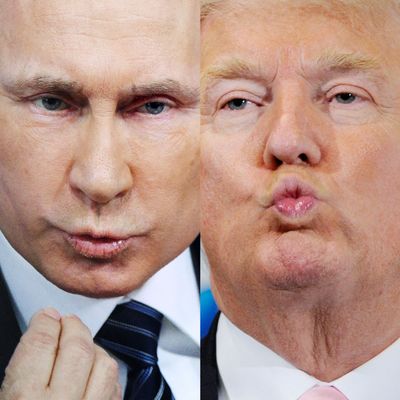
From the standpoint of the United States, the prospect that a President Donald Trump would be unduly influenced by Vladimir Putin has paled beside the far more harrowing prospect that he would be Vladimir Putin. Still, Trump’s relationship with Putin is creepy and mysterious. Some of its elements lie perfectly visible — the exchange of compliments between the two men, Putin’s efforts to help elect Trump, Trump’s adoption of unusually Russophilic policies on Ukraine, and the financial ties between Trump’s campaign and the Kremlin. The latter is coming more clearly into view with several new reports today.
1. Paul Manafort, Trump’s campaign manager, previously worked on behalf of a pro-Russian candidate’s effort to bring Ukraine back into Moscow’s orbit, a campaign that enjoyed Russian support. Michael Crowley reports that Manafort’s joining the Trump campaign was an inflection point. Despite a fondness for Putin as a strong leader who crushes his enemies, Trump had a hawkish line on his aggression against Ukraine. “We should definitely be strong. We should definitely do sanctions,” said Trump, who described Putin’s seizure of Crimea as taking Ukraine’s “heart and soul.” Since Manafort signed on, his tone has changed radically.
2. A second source of influence on Trump’s Russia policy is his Russia adviser, Carter Page. Christina Wilkie and S.V. Date report that, just days before Trump’s convention (where his campaign beat back a plank to endorse defensive weapons for Ukraine), Page traveled to Russia and delivered speeches criticizing American policy toward Russia as “hypocritical,” and called for an end to the sanctions imposed after the Ukraine invasion.
As Masha Froliak notes, Page is heavily invested in Gazprom. Gazprom is not merely a Russian firm the way Apple is an American one. It is a lever of the regime’s power, used to dispense patronage to allies and threaten countries that stand in the way of Russia’s foreign-policy goals. Page has complained that the sanctions hurt his energy firm’s bottom line.
3. Jeff Nesbit delves into the murky — and largely hidden — financial connections between Trump and Russia. This is the most potentially explosive piece of the relationship, and also the most inscrutable. Nesbit cites a lawsuit against Trump Soho, a hotel project that attracted financing from Russian underworld figures. (Read Michael Idov’s 2008 New York feature on the murky construction of the building.) A lawsuit cited by Nesbit “alleged that a primary source of funding for Trump’s big projects with Bayrock arrived ‘magically’ from sources in Russia and Kazakhstan whenever the business interest needed funding.” (Bayrock denies this and says that the allegation is absent from an amended version of the lawsuit.) This gets closer to the deepest suspicion surrounding Trump: Because his multiple bankruptcies have made him un-creditworthy — banks don’t like lending money to people who make a practice of not paying back the loans — he has had to turn to unconventional sources. It is possible Trump is merely intertwined with Russians, as with other sources of capital. But it is also possible he has grown uniquely dependent on them in a way that gives Russia leverage over his policies.
The Trump-Russia connection would be a first-tier campaign scandal and probably a complete disqualification by its own volition, if it were not for the daily parade of jaw-dropping offenses that have commanded attention. There’s a reason why the Russian propaganda apparatus on television and the internet have thrown themselves behind Trump, and why the Russian hack of the Democratic National Committee was released at just the time when it could do the most damage. What we don’t know for certain is just what that reason is.






























